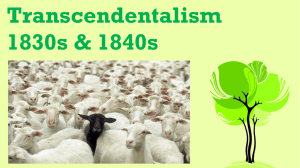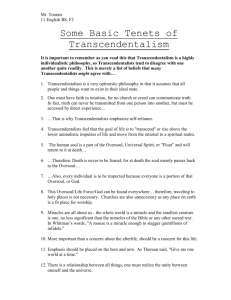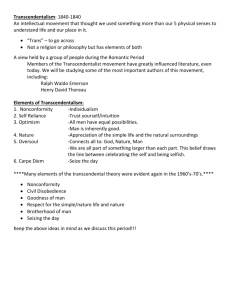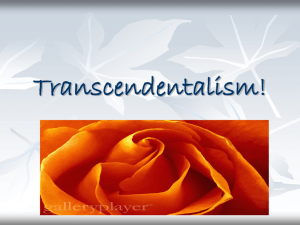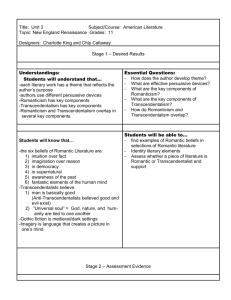American Transcendentalism 1830-1855 Transcendentalism
advertisement
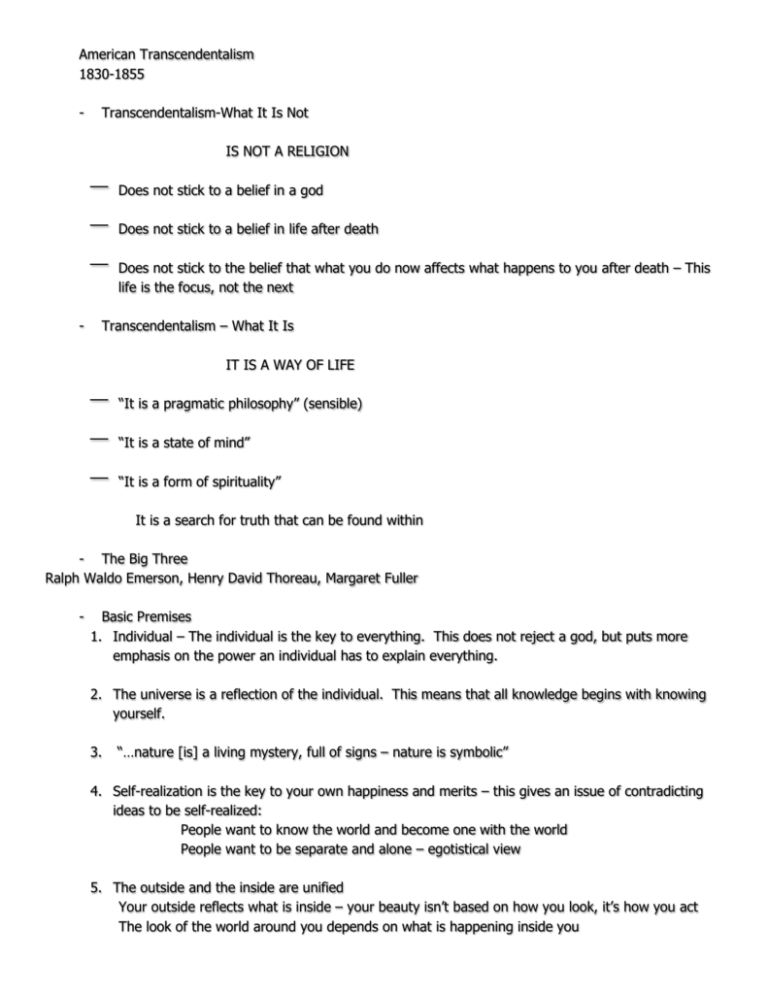
American Transcendentalism 1830-1855 - Transcendentalism-What It Is Not IS NOT A RELIGION – – – - Does not stick to a belief in a god Does not stick to a belief in life after death Does not stick to the belief that what you do now affects what happens to you after death – This life is the focus, not the next Transcendentalism – What It Is IT IS A WAY OF LIFE – – – “It is a pragmatic philosophy” (sensible) “It is a state of mind” “It is a form of spirituality” It is a search for truth that can be found within - The Big Three Ralph Waldo Emerson, Henry David Thoreau, Margaret Fuller - Basic Premises 1. Individual – The individual is the key to everything. This does not reject a god, but puts more emphasis on the power an individual has to explain everything. 2. The universe is a reflection of the individual. This means that all knowledge begins with knowing yourself. 3. “…nature [is] a living mystery, full of signs – nature is symbolic” 4. Self-realization is the key to your own happiness and merits – this gives an issue of contradicting ideas to be self-realized: People want to know the world and become one with the world People want to be separate and alone – egotistical view 5. The outside and the inside are unified Your outside reflects what is inside – your beauty isn’t based on how you look, it’s how you act The look of the world around you depends on what is happening inside you 6. To know and understand nature is directly affected by knowing yourself – these are one and the same. If you can’t understand yourself, perhaps studying nature can help you find yourself. - - Relation to Religion and Romanticism Puritanism: morals and belief in a “’divine light’” Quakerism: “’inner light’” Unitarianism: morals came from the individual Romanticism: “nature is a living mystery” Basic Tenants 1. Form of idealism (impracticality) 2. Must rise above the primitive of human kind 3. We are all part of the Oversoul – it is where we go when we die Everyone has a part of Oversoul and the Oversoul is everywhere God is in physical nature and man 4. Biblical miracles have little to no import; instead, the world around us is full of miracles, even through the smallest creatures 5. Satan is not actively working on earth; mankind is generally good, but occasionally does bad things by not thinking things through or ignorance. 6. Death should not be found scary – one simply dies and becomes part of the Oversoul 7. Live in the here-and-now 8. Self-reliance and human thinking are important – this determines our fate 9. Great leaders show us what we can become 10. Being consistent is unnecessary because our opinions and thoughts may change day by day 11. True reform comes from within oneself Credits Reuben, Paul P. “Chapter 4; Early Nineteenth Century: American Transcendentalism: A Brief Introduction” PAL: Perspectives in American Literature – A Research and Reference Guide. 19 Apr. 2004 http://www.csustan.edu/english/reuben/pal/chap4/4intro.html Updated 11/2/10 American Transcendentalism 1830-1855 TO BEGIN…how important do you think it is to be yourself – an individual? On the other hand, how individualized do you think most people are? Explain this viewpoint. - Transcendentalism-What It Is Not IS NOT A RELIGION – Does not stick to a belief in a god – Does not stick to a belief in life after death – Does not stick to the belief that what you do now affects what happens to you after death – This life is the focus, not the next How do you believe this viewpoint relates to the way people think today? - Transcendentalism – What It Is IT IS A WAY OF LIFE – “It is a pragmatic philosophy” (sensible) – “It is a state of mind” – “It is a form of spirituality” - It is a search for truth that can be found within Where do you think people search for truth today? Why? The Big Three Ralph Waldo Emerson, Henry David Thoreau, Margaret Fuller Basic Premises 1. Individual – The individual is the key to everything. This does not reject a god, but puts more emphasis on the power an individual has to explain everything. 2. The universe is a reflection of the individual. This means that all knowledge begins with knowing yourself. How do these viewpoints of the individual differ from today’s viewpoints? 3. “…nature [is] a living mystery, full of signs – nature is symbolic” 4. To know and understand nature is directly affected by knowing yourself – these are one and the same. If you can’t understand yourself, perhaps studying nature can help you find yourself. How does this differ from modern viewpoints of nature? 5. Self-realization is the key to your own happiness and merits – this gives an issue of contradicting ideas to be self-realized: People want to know the world and become one with the world People want to be separate and alone – egotistical view How important do you feel it is to know who you are and how you feel about certain things? 6. The outside and the inside are unified Your outside reflects what is inside – your beauty isn’t based on how you look, it’s how you act The look of the world around you depends on what is happening inside you Do you agree or disagree with that statement? Explain. Relation to Religion and Romanticism Puritanism: morals and belief in a “’divine light’” Quakerism: “’inner light’” Unitarianism: morals came from the individual Romanticism: “nature is a living mystery” 1. 2. Basic Tenants Form of idealism (impracticality) Must rise above the primitive of human kind Are people too impulsive today? Explain. 3. We are all part of the Oversoul – it is where we go when we die Everyone has a part of Oversoul and the Oversoul is everywhere God is in physical nature and man 4. Biblical miracles have little to no import; instead, the world around us is full of miracles, even through the smallest creatures Do agree or disagree with this statement? Explain. 5. Satan is not actively working on earth; mankind is generally good, but occasionally does bad things by not thinking things through or ignorance. Do you agree or disagree? Explain. 6. Death should not be found scary – one simply dies and becomes part of the Oversoul 7. Live in the here-and-now Do you agree or disagree? Explain. 8. 9. 10. 11. Self-reliance and human thinking are important – this determines our fate Great leaders show us what we can become Being consistent is unnecessary because our opinions and thoughts may change day by day True reform comes from within oneself Write a three-sentence summary of transcendentalism that you could use to teach another person about what transcendentalism is. Credits Reuben, Paul P. “Chapter 4; Early Nineteenth Century: American Transcendentalism: A Brief Introduction” PAL: Perspectives in American Literature – A Research and Reference Guide. 19 Apr. 2004 http://www.csustan.edu/english/reuben/pal/chap4/4intro.html Updated 11/2/10
